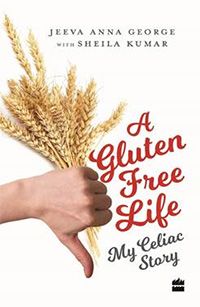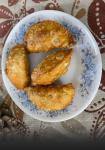'Do not feel ashamed. Eat right. Sleep well. Never go hungry.'
Jeeva Anne George who has celiac, explains how she took control of her life.

'If you feel like cheating, just think about all the horrible symptoms that pop up the moment you have ingested some gluten,' says Anna George.
Photograph: Hitesh Harisinghani/Rediff.com
Celiac disease is a chronic autoimmune disorder, mostly induced due to consumption of gluten proteins. It affects nearly 1 per cent of the world's population.
"Sometimes I had joint pains, and other times, I would notice that my hair was falling, a big blow to someone who always had a head full of healthy, shiny hair. Then, at times, I was spitting up mucus," Jeeva Anna George who was diagnosed with celiac writes in her book A Gluten-Free Life : My Celiac Story which she co-authored with Sheila Kumar.
In the book, the author shares some key pointers to help people deal with the condition and lead a healthy, gluten-free life:
Presenting an excerpt from the book for you to read:

It has been a while since I have gone gluten-free.
When I look back, I wish I had known all the things I now know.
All too unfortunately, people are being diagnosed with celiac disease on a regular basis and have no choice but to adopt the gluten-free way of life.
This, then, is for my fellow celiacs: my twenty pointers for daily living.
1. Know that you are not alone, there are many like you in India and all over the world.
Some are diagnosed as celiacs and some will never be diagnosed, due to a variety of reasons.
Believe me when I tell you, it is better to know. Be happy that you know where you stand.
Before things can get worse, you have cracked the problem. You do not have to inject yourself or take any medication; your condition can be managed by eating right.
2. As of now, there is no known cure for celiac disease other than going gluten-free.
Research is under way in institutions around the world; some institutions claim they have found a cure but the tests are still in their experimental stage.
There are a lot of claims that Ayurveda, Homeopathy and many other alternate therapies can cure celiac disease but none of these claims have been proved.
Many gullible people have undergone treatments only to find that after six months, their condition is even worse than before they started. I do believe that many of the alternate therapies help in improving immunity and most good Homeopaths and Ayurvedic doctors will tell you the same.
However, they offer no solution to enable you to start eating gluten again. If you just have wheat allergy, though, alternate therapies just might help.
3. If it has been a month since you went glutenfree and you do not feel any difference, do not become anxious.
The healing process is gradual; it takes anywhere between three and six months, sometimes even a full year for some people.
4. There are health benefits aplenty to being a celiac. No, I mean it. You will begin to eat healthy simply because you have no choice.
Speaking for myself and a few of my celiac friends, we all now read labels and know exactly what we are eating, and we tend to eat less processed food and more fresh home cooked meals.
There are a lot of things that I eat today which I could not have imagined eating before I went gluten-free; I eat them now because I know it is good for me, and in some cases, I have happily acquired the taste for those foods!
My immunity has definitely reduced the frequency of me catching a cold, and my coughing episodes have also come down drastically.
I am not anaemic anymore and here’s one more thing: I can lose weight more easily while earlier it was difficult to do so even when I tried really hard to do so.
5. Follow a balanced diet with a mixture of whole grains.
It always better to not eat too much of any one grain, vegetable or fruit.
Eating moderately and ingesting moderate amounts of any food ensures the food nourishes the body.
Other than gluten, do not go off any food completely unless you feel it is giving you trouble. This goes for those who are on a normal diet, too: the best approach is to follow a balanced diet wherein you do not depend on one grain or a few food groups alone.
If you are a person who easily and enthusiastically adopts the latest health fad, make sure you research it and understand how it is going to help you.
I would not advice anyone to go off anything unless they have a problem with that particular food, but rather to follow a good balanced diet which includes all the food groups.
Today coconut oil might be anointed the miracle oil, tomorrow it will be some other oil, some other diet. Respect and listen to your body; what works for others might not work for you and vice versa.
6. For those who are asymptomatic, the best way is to get yourself tested, either three months or six months after your diagnosis.
7. I cannot repeat this enough: read labels. It will spare you a lot of doubt and confusion as well as ill-health. If the doubt and confusion persists, I would recommend entirely bypassing the food or ingredient.
8. Maintain a food diary, at least initially. It will help you understand if certain foods do not agree with you, or if something you ate inadvertently had gluten in it.
If you are the parent of a gluten intolerant child, then a food diary is invaluable because when you notice unexplained symptoms, the diary can help you make three deductions:
- either something you gave your child has gluten in it
- or your child has been cheating on the diet,
- or there may be some other food intolerance that has reared its head.
9. Adhere to a strict gluten-free diet and if you feel like cheating, just think about all the horrible symptoms that pop up the moment you have ingested some gluten.
After all, prevention is definitely better than any cure. Then again, do not feel bad if you accidentally ingest gluten, it happens to everyone all over the world. You know what to do next.
10. Carry an emergency stash of ready-to-eat food in your bag, car or office drawer at all times.
11. For young people living in hostels or someplace where you have no option to cater to your own meals, always keep ready-to-eat food so that in case of any problem, you will not go hungry.
Fruits, dried fruit, nuts, gluten-free cereal, biscuits, energy bars can all be stored in your room for emergency situations.
Do not feel ashamed or hesitant about informing your college or hostel authorities about your need to follow health precautions.
You are in charge of your well-being, and for a celiac disease sufferer, safe food is critical.
While speaking to those in charge, always make clear the seriousness of your problem. Also, make friends with the catering staff. A little thoughtfulness and politeness can take you a long way.
12. Plan. Plan. And plan some more. Almost half the stress which is attached to going gluten-free can be avoided if you plan ahead.
If you are a parent, plan your child’s meals a week in advance, with alternate options so you do not behave like a headless chicken if you run out of a particular food ingredient or product. If you are travelling, do the necessary planning so you can have a safe, stress-free journey.
13. Working adults, make sure you always have proper -- safe -- food at all times.
Make sure you eat at the right time, never go hungry and always take the time to go for a small walk, or look away from your screen if you start to feel uncomfortable.
Make sure you get proper sleep that is one thing which will refresh you.
Listen to me, I speak from experience. I learned the hard way that good health cannot be bought and that no job will wait or you if you have to keep taking off from work.
Skipping meals, not sleeping enough and not taking enough breaks is eventually going to make you extremely tired. So, take care of yourself.
14. Always keep emergency medication in your bag, briefcase or pocket.
15. If you are suffering from diarrhoea because of getting accidentally glutened, keep eating small meals throughout the day so you are not very tired by the time you get home. Always remain hydrated. Most people working in air-conditioned offices forget to drink water regularly.
16. It is always good to confide in colleagues you work closely with, and your boss too, about your medical condition. Being open about it will help a lot when you have to go on team outings, travel on work and even while working alongside others.
Also, in case of any emergency, they will know you have a prior medical condition.
17. Stress triggers all sorts of health problems and also lowers one’s immunity. I have noticed it in myself and in many others who are gluten-intolerant.
It affects their sleep too, and slowly, the person becomes really exhausted.
One of the things that helps me is to switch off or not use too many electronic gadgets late in the evening. This gets your body to totally relax and not stay eternally vigilant and alert.
For a person like me, who used to always and immediately reply to messages and e-mails, it was very difficult to bring that discipline into my life. But eventually it worked well for me; I sleep better and I no longer have my phone stuck to my ear or scan my mail. It is a great discipline to follow for anyone.
I would also add this: pick your battles. Sometimes we have to do a lot of explaining to make others understand our medical condition.
You will come across people who will act insensitive, even obnoxious. Do not stress yourself out trying to make them understand and do not let that make you feel bad or annoyed. It is not worth it nor are they.
18. Always inform family and friends of your diet restrictions if you are staying over or visiting for a meal. If you do so, you can spend time happily socialising rather than painstakingly explaining your diet to your host at the nth minute, as also anxiously checking out the food arrayed on the table.
19. Network. It is good to meet and make friends with other gluten-intolerant people, so there are enough people who can empathize with you and also share necessary information. There are many eliac support groups on Facebook and other social media platforms which you could join. You could also become a member of organisations like the Celiac Society of India or the Celiac Society Organisation, and many other local and regional organisations.
20. Laughter really is the best medicine. Learn to laugh at yourself and your circumstances. I do not get offended anymore when I face bizarre reactions or comments from people who have not heard of gluten intolerance. I laugh it off and share the joke with others who get it; this way, it helps them and me look at various ways of spreading awareness.
Excerpted from A Gluten-Free Life : My Celiac Story by Jeeva Anna George and Sheila Kumar with the permission of the publishers, HarperCollins Publishers India.











 © 2025
© 2025